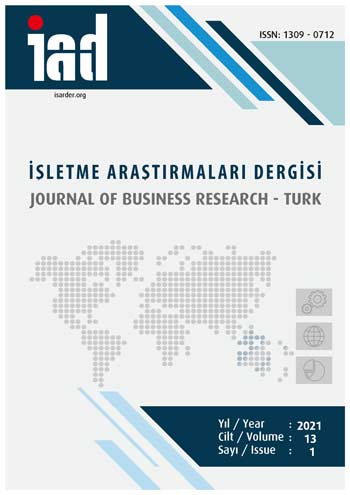İmalat İşletmelerinin Sürdürülebilir Süreç İnovasyonu (SSİ) Faaliyet ve Sonuçlarının PLS-SEM ile Değerlendirilmesi
The Evaluation of Sustainable Process Innovation (SPI) Activities and Results in Manufacturing Organization via PLS-SEM
Author(s): Eyüp ÇalıkSubject(s): Business Economy / Management, Energy and Environmental Studies
Published by: İşletme Araştırmaları Dergisi
Keywords: Sustainable process innovation; Activities; Results; PLS-SEM; Manufacturing;
Summary/Abstract: Purpose – To investigate with the help of an exploratory model whether the expenditures for sustainable process innovation in the food, chemical, metal, automotive and textile sectors that stand out in the manufacturing sector affect the environmental and social activities of SPI and also whether these activities have a positive effect on the SPI results. Design/methodology/approach – Data were collected from manufacturing companies through an online questionnaire and data analysis was performed using the PLS-SEM methodology via Smart PLS software. Findings – Sustainable process innovation expenditures have a positive impact on environmental and social activities in all sectors. While it was observed that the environmental activities carried out to obtain SPI reached the results of SPI in all sectors, it was revealed that social-oriented activities had a positive effect on the SPI results in the automotive and textile sectors, but these activities did not achieve the desired results in other sectors. Discussion – The positive reflection of the expenditures to gain SPI to realize environmental and social focused SPI activities in all sectors can be an indicator of the ability of the manufacturing sector to transfer SPI inputs to these processes. Similarly, the positive impact of environmentally focused activities on SPI results leads to the outcomes that the acquisition of new sustainable processes or significant improvement of existing processes can be successfully implemented internally and registered. Moreover, social-focused activities are handled in an integrity in automotive and textile enterprises and included in the manufacturing processes while other three sectors have not been satisfactory to integrate these activities into processes and to register their results.
Journal: İşletme Araştırmaları Dergisi
- Issue Year: 13/2021
- Issue No: 1
- Page Range: 67-82
- Page Count: 16
- Language: Turkish

